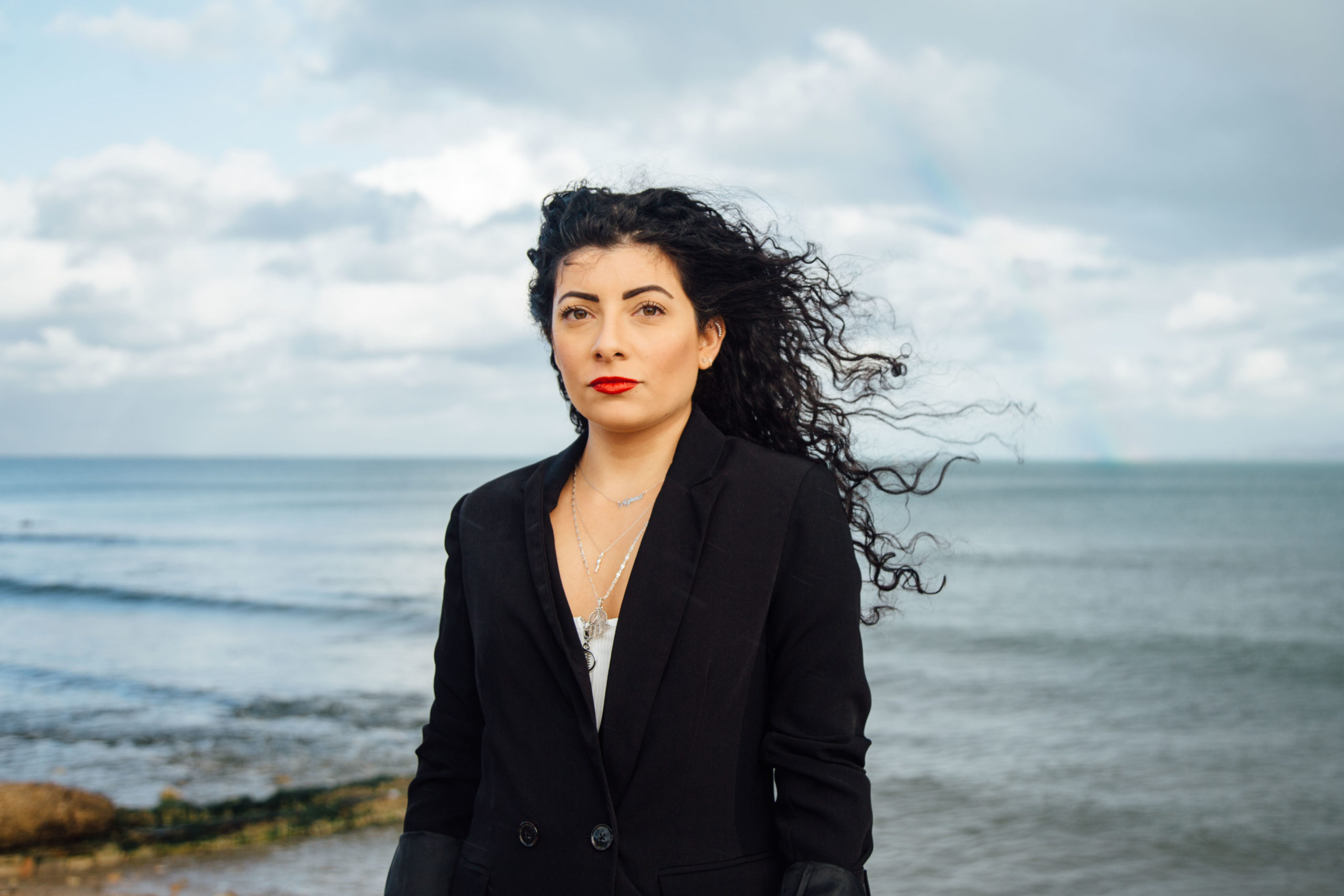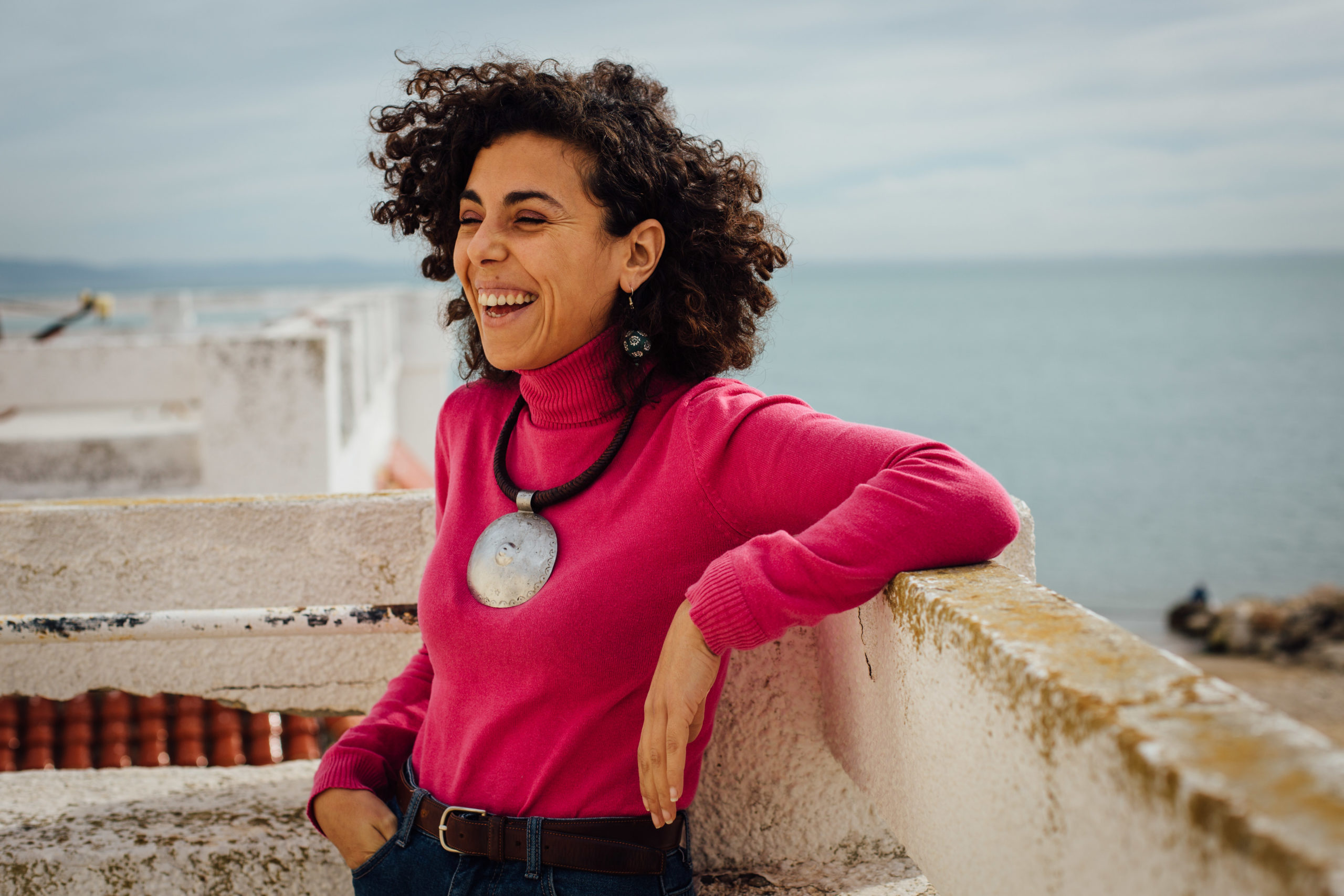TUNIS— On a cold and clear December morning, fifty or so women and a handful of men gathered outside the parking lot of Tunisia’s Parliament to confront legislators on their way into work. Gray-haired women in chic puffer jackets and sunglasses stood shoulder to shoulder with millennials who brandished signs with slogans like “They piss on us and we say it’s raining!” and “I’m so tired of this I don’t know what to write anymore.” They were joined by a few teenagers, one eagerly bouncing on her toes as the first car pulled up to the gates. It was showtime.
A few days earlier, Mohamed Affes, a legislator from the ultra-conservative Al Karama coalition, had given an incendiary speech about Tunisia’s women on the parliament floor. He flew into a tirade about a landmark law against sexual violence, and labeled single mothers “whores.” None of his colleagues made an attempt to cut him off or cool him down. The women gathered outside the Parliament wanted to make sure that wouldn’t happen again.
Ten years ago this past January, Tunisia’s feminists fought in the revolution that toppled President Zine El Abidine Ben Ali after a 23-year rule, and ushered in an era of newfound freedoms. In the decade since, they’ve secured some of the most progressive rights in the Arab world, including the groundbreaking law on sexual violence Affes scorned in his speech. Now they’re fighting to help the most vulnerable women in their country find their voices, know their rights, and hold the powerful to account for ignoring the laws they signed onto.
“We are on the side of victims. We believe everything they say. That’s our position. We are not neutral, and we are very proud of it.”
Najma Kousri Labidi, Activist
The #EnaZeda (#MeToo in Tunisian Arabic) Facebook page collects and publishes first-person accounts of sexual harassment, abuse and violence against women and LGBTQ+ Tunisians. The page, which now has over 68,000 followers, was created in the autumn of 2019, after a recently-elected legislator was caught on tape masturbating outside a girls’ high school – a charge he denies. The scandal ignited a wave of women talking about the abuse they, too, had suffered.
“The ones that impact me the most are the ones who say they want to kill themselves,” says Najma Kousri Labidi, 29, one of the founders of the page.
First-person accounts bubbled up sporadically on Facebook, but Kousri Labidi and another young Tunisian woman created the Facebook page after seeing a need for a hub to share these stories. Now a team of four, they dedicate hours every week collecting testimonies — more than 3,600 to date — from women across the country. Last summer, during the lockdown, the team was publishing around 30 testimonies a day.
Their accounts are full of conflicting emotions of pain, shame and rage. They detail everything from persistent, violent street harassment to incest and psychological abuse by family members.

One representative testimony from February reads: “I was five, or maybe seven… He was 18 at the time… He put me on his lap which seemed normal because he always did – then he showed me his penis, and told me to touch it….I can’t be close with men anymore. Is there a professional who can help me?”
#EnaZeda publishes the accounts it receives as is, only redacting graphic images and names so victims avoid defamation suits. (They don’t verify the accounts independently.) “We are on the side of victims,” Kousri Labidi said. “We believe everything they say. That’s our position. We are not neutral, and we are very proud of it.”
Unlike the #MeToo movements in Europe and the U.S., which ousted high-powered men across industries, the #EnaZeda testimonies are largely familial. But their graphic yet grindingly quotidian nature has shattered the veneer of Tunisia as a stronghold for women’s rights.
Fake Feminism
“Tunisia was branded as the best place for women and gender equality in the region,” said Sarah Yerkes, senior fellow at the Carnegie Endowment for International Peace’s Middle East program. Progressive laws dating back to the 1950s gave women autonomy in marriage, educational opportunities and access to birth control and abortion—often before those same rights were enjoyed by women in Europe. Tunisian women own property and businesses, outpace men in attending university, and actively participate in civil society. More than a quarter of Tunisia’s legislators are women and they represent parties across the political spectrum.
Three years ago, after years of lobbying from feminists and with the support of then-president Beji Caid Essebsi, Tunisia’s parliament passed Law 58, a piece of anti-sexual violence legislation that is the first of its kind in the Arab world. The sweeping law criminalizes not only physical attacks—including street harassment and marital rape—but also economic, psychological and political abuse of women. Human rights organizations around the world hailed it as a major victory; UN Women called the vote “historic.”
But the implementation of the law has been troubled. Reporting mechanisms can be convoluted and demeaning, often requiring women to detail their abuses in the open areas of police stations in the presence of crime suspects waiting to be processed. Often, the police are complicit in the crimes they are supposed to guard against, rights groups say.
For decades, Tunisia’s leaders used the police to seed terror and compliance in the public. After the revolution, the Truth and Dignity Commission unearthed thousands of claims of police abuse and torture, including sexual abuse of both men and women. Though the old regime has been purged, both the leadership and the rank and file of the police and other security forces remain largely intact. And while police harassment is a universal problem for Tunisians, women feel its effects in acute ways, particularly when it comes to reporting sexual crimes.
“The law exists,” Kousri Labidi said, “but the problem is that the judges don’t use it, the police don’t give a shit about it, and people don’t even know it exists.”
Impunity for Policy Makers
A lack of transparency in Tunisia’s legal system means that more than three years after its adoption, there are no official numbers as to how many cases have been brought under Law 58. (Many activists think there may only have been a handful.) It is almost impossible to tell if anyone has been convicted. The highest profile case, against the legislator caught on camera, fizzled thanks to a legal loophole that grants immunity—and many argue impunity—to those who hold political office.
“Tunisia looks really good on paper,” Yerkes, the Carnegie fellow, said. “But the gender-based violence law has not been implemented.”
Many women, especially those in the impoverished interior of the country where literacy is low and media limited, simply do not know that the law protects them when their brothers hit them, their employer harasses them or their husband forces them into having sex, she added.
It is those women whom Henda Chennaoui, 37, who was protesting outside Parliament in December, is trying to reach. A longtime activist, Chennaoui was among the journalists and bloggers who disseminated information underground during the revolution through private Facebook groups and direct messages. When Ben Ali fled, “everything in my life changed,” she said. “As a journalist, as a woman, as an activist. Everything changed.”

His departure opened the door for a new kind of feminism to flourish in Tunisia, one that is intersectional and freer of government influence.
For decades Ben Ali maintained tight control over feminist organizations and their agenda, leveraging them to appear progressive in the eyes of foreign nations and organizations like the World Bank and IMF, whose aid lined his regime’s coffers. While his policies benefited upper and middle class secular women in coastal cities, the regime did little to help women in the country’s interior regions—many of whom work in grueling manual labor and languish in abusive marriages.
The previous generation of feminism was there “just to defend the legitimacy of the state,” Chennaoui said.
“Tunisia looks really good on paper. But the gender-based violence law has not been implemented.”
Sarah Yerkes, Carnegie Endowment for International Peace Middle East program
Tired of relying on laws that go unenforced by police, Chennaoui is using the techniques she honed during the revolution to reframe the conversation around gender equality and help women in hard-to-reach places know their rights. She produces short videos in the local dialect that break down the basics of feminism and women’s rights in straightforward, conversational ways, and puts them out on Facebook. “I want to help young women have a vocabulary, confidence and a sense of solidarity,” she said.
That desire to empower women through information comes from Chennaoui’s own experience. A victim of sexual violence at a young age, Chennaoui blamed herself. As a teen, she discovered French bloggers writing about feminism, gender-based violence and sexual assault. “I just realized that I’m not alone and all the violence that I have experienced was not because of me,” she said.
She began her own blog, with musings on culture intertwined with budding ideas of feminism. In one post, she wrote frankly about her experiences as a victim of violence, rape and sexual harassment. Replies streamed in from Muslim and Arab women living all over the world for whom her message resonated.
“I received a lot of messages from people saying they had the same experiences in their family,” she said. “I realized that feminism can save lives. Feminism, and the internet.”
But even if the mentality around women’s roles shifts, there’s still a major hurdle to overcome: economic inequality.
Despite outpacing men in receiving higher education degrees, the World Bank estimates the unemployment rate for women in Tunisia at 22.5% in 2020, or ten percentage points higher than for men. Tunisia’s low-skill economic model, which relies heavily on cheap exports and budget tourism, means that jobs available to women are often low-wage or lacking in mobility.
“There is still a very male dominated environment in the society and workplaces,” said Olfa Arfaoui, 37, a social activist and entrepreneur. Cronyism and corruption—which Tunisians identified in a recent poll as the third most urgent issue facing their country—have long plagued Tunisia, in both the public and private sector. Without connections or capital, women languish on the lower-rung of businesses. 10.4% of Tunisian companies have a woman in a top management role, according to the World Bank: compared to 37% in France.
“Even if women led companies, they wouldn’t have the same access to investments, to the banking system and to loans,” because of the same “corruption” that keeps them out of the corner office, Arfaoui pointed out.
After the revolution, Arfaoui tried to reshape how the private sector viewed women by coaching business executives. While working, she frequently heard concerns about women’s perceived volatile emotions and obligations with children getting in the way of their work. That improved over time, but Arfaoui hopes that her newest venture will speed things up.
That effort, the DJ Academy for Girls, is located within an art studio in the warehouse district in Tunis’ bustling downtown. On a recent day, a group of young women huddled around a set of turntables in a soundproof booth, bobbing their heads as electronic dance music thudded. One stood at the controls, tweaking knobs and dials as one song slowly started to morph into another. When it did, the rest of the room melted into cheers.
Arfaoui founded the Academy as a place not only to teach young women a marketable skill, which many put to use as wedding DJs or in clubs and restaurants around the country, but also to open up conversations about gender-based violence and sexism.
“Women in Tunisia face so many problems,” said 23-year-old Asma Andolsi, one of the workshop’s participants. “I was bullied because I’m a woman and they think you’re inferior. That’s the dominant culture here. When a boy applies for something and when a girl applies for something, they choose the boy.”
But she says the workshop has encouraged her to speak up about injustice she sees. “It’s like we have a purpose and you try to find creative ways to show what you believe in and what your values are…. If you don’t accept these things, you should change them instead of facing the same things every day because it’s not going to change by itself. DJing is a really modern way of addressing those issues.”
The DJ Academy also tacitly functions as a safe space for LGBTQ+ Tunisians, though Arfaoui doesn’t play it up, “especially if you are working with women from conservative backgrounds, who can’t say ‘Mom I am going to this feminist, queer space,’” she said.
Even if their mothers might not understand, many of the participants at the DJ academy embody the next wave of Tunisian feminists: Those who grew up after the revolution, and who want more than just the women’s rights their mothers and grandmothers fought for.
For many, that means also taking on injustice against LGBTQ+ Tunisians. Homosexuality is still criminalized in the country, and despite a small but robust queer community in the capital, LGBTQ+ Tunisians are routinely targeted for violence.
That reality played out in front of Tunisia’s parliament in December. The protest brought together both feminist and LGBTQ+ activist organizations under one banner. But when clashes erupted between the crowd and an incensed parliamentarian, it didn’t go unnoticed that many LGBTQ+ activists were targeted for arrest. Among them was Rania Amdouni, a prominent activist who in early March was sentenced to six months in prison on charges of “insulting police and abuse of morals” after she tried to file a complaint about police harassment.)
Moments after learning her friends and fellow activists had been arrested, Chennaoui was penning a Facebook post condemning the action. “I never lose hope,” she said. “There is a long way to go to get things changed, but we have to do it. It’s a duty, and we have to continue at a minimum to talk about the problems.”


 Erin Clare Brown
Erin Clare Brown
